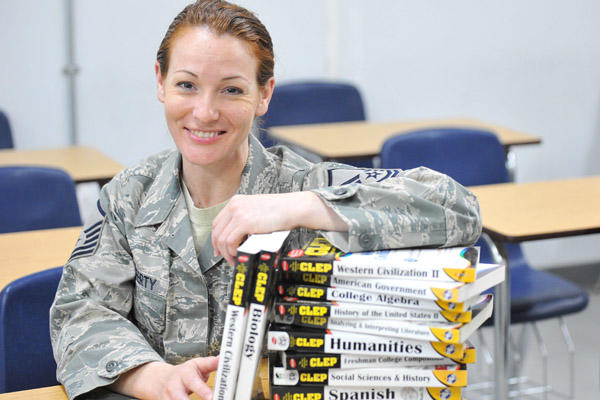Often times when people transfer from one college to another many of their hard earned credits do not transfer to the new school. This is especially frustrating for veterans and servicemembers who are often more mobile than the general public.
The non-profit public/private partnership LearningLifetime PBC has announced the formation of the new National College Transfer Center, whose mission is to increase the graduation rate among the 15 million adult and transfer students each decade who change colleges in pursuit of their degrees by enabling them to avoid their greatest obstacle to graduation: losing the credits they have already earned when they move from one institution to another.
Statistics show that losing credit when transferring colleges is one of the biggest obstacles to graduation:
- 1 in every 3 college students attends more than one institution in quest of a degree
- Almost 2 in 5 students lose all of their previously earned credits at their new institutions, set back an average of a full year of courses; another 1 in 5 lose half that many
- More than $6 billion is wasted annually on tuition and fees for courses not applicable to students' new degrees, increasing student debt and default
- Students who receive credit for 90% or more of the courses they've already taken are 250% more likely to graduate than the 1 in 7 students for whom 90% or more of their prior credits are rejected
- And most critical and far-reaching: as a direct result of credits lost in transfer, 1 1/2 million students every decade fail to earn their college degrees, often permanently ending their opportunity to move up the economic ladder and impeding the possibility for their next generation
The new National College Transfer Center will enable military students to see what courses and credits will most likely transfer to a new school before they enroll in classes or select a degree program.
The Transfer Center is going to “flip” the transfer audit process so that, instead of Veterans and servicemembers learning how much credit they can earn for their military training and prior courses only after they enroll in a college, when virtually all institutions now perform their official transfer credit audits, Veterans and servicemembers selecting colleges will be able to receive highly accurate estimates of their likely credit awards for their military training and the courses they've already taken while they're still in the process of selecting a new degree program. With this information, they can compare their likely transfer credit awards – even the differences in transfer credit awards among Yellow Ribbon institutions - and begin their new degree programs as close to completing them as possible.
The company has already used its unique technology to advise tens of thousands of Army National Guard and Army Reserve soldiers on their best degree opportunities, it is keenly aware that no students are in greater danger of losing more possible college credits than Veterans and active and reserve servicemembers who have earned college credit recommendations for their military service.
The National College Transfer Center will be free to all Veterans, active and reserve servicemembers, spouses, family members – anyone who is considering changing or returning to a new college. Comparing likely transfer credit awards goes an important step further than even the new, online post-secondary tools just launched by the VA. And, it will cost nothing for the VA and DoD to incorporate Transfer Center estimates into their existing websites dedicated to higher education, if they elect to do so.
“States, institutions, the services, DANTES, SOC and now the VA have done an enormous amount of detailed, painstaking work to help military students transfer and earn credit for their service,” said Su Flickinger, Chief Academic Officer of LearningLifetime. “Yet, it's indicative of just how challenging the problem of losing transfer credit is that all these efforts are able to help only a small fraction of the transfer students who need it – mostly those who transfer in-state between 2- and 4-year public institutions. And that rarely includes Veterans and about-to-transition servicemembers.”
The National College Transfer Center is in its organizational stage and one of the key factors in its development will be feedback from the military community. Will transitioning servicemembers use it? How can it be most helpful? One or more community-focused or statewide pilots is targeted for Summer or early Fall, 2016, but, recognizing the urgency, the National College Transfer Center would like to enable all transitioning servicemembers, and those already back home, to take advantage of the transfer credit comparisons - regardless of where they live.
“When our Veterans and servicemembers lose college credits they've already earned it hurts in a couple of ways,” said Michael Falk, creator of the National College Transfer Center concept. “On the one hand, having to repeat courses, or not having their military training recognized by their new institutions, uses up more of their Tuition Assistance and GI Bill benefits. And it also means that it takes many Veterans longer than necessary to get out into the civilian job market with a 2-year or 4-year degree in hand that will qualify them for good paying jobs back home. There's no guarantee that every course taken or credits recommended through the Military Guide can be applied to any degree program, but we sure want to give Veterans and servicemembers the chance to use the credit estimates the National College Transfer Center can provide to give them the best start towards their new, civilian life. We owe it to them and what's good for them is even better for our nation.”
ABOUT LEARNINGLIFETIME PBC
LearningLifetime PBC was formed as a public benefit corporation to enable the company to pursue activities in the best interests of the public. The company's audit technology that makes the National College Transfer Center possible has been used on a national scale by the Army National Guard, Army Reserve, Motorola, Northrop Grumman, Colgate Palmolive, IAM-Boeing and the Department of Labor, among others, in programs that provided pre-enrollment transfer credit advising to tens of thousands of students entering a new degree program.
Website: http://www.learninglifetime.com





